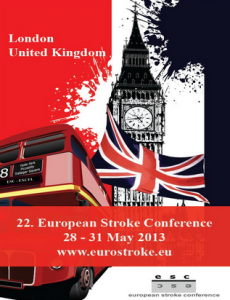15 million people suffer from a stroke each year, according to the World Health Organisation. Of this number, 5 million people will die, and a further 5 million people are left with a permanent disability. With stroke having such a vast global impact, research into stroke prevention and treatment, as well as investigating ways that we can improve the quality of life of those who have had a stroke, is vital.
The European Stroke Conference is a key event which facilitates in advancing our knowledge and understanding of stroke, improving our ability to be able to prevent and treat it. Last month, I attended the 22nd European Stroke Conference (ESC), on behalf of Experimental & Translational Stroke Medicine, an open access journal dedicated to identifying and solving problems in translational stroke research. Attracting almost 4000 delegates across research and clinical practice, the conference served to stimulate discussion on a wide range of topics from experimental and translational stroke research, to clinical trials and post-stroke care.
On the opening day, the 4th International Congress of Clinical Neuromusicology took place in conjunction with the ESC, showcasing a range of fascinating insights into neurologic music therapy, and including talks on how music can be used to assist in retraining the brain and regaining motor control after a stroke.
 The next day marked the start of the ESC’s topical symposiums and oral sessions, spanning three days and highlighting some of the field’s high quality research and innovative developments in such areas as acute stroke, rehabilitation and reorganisation, translational stroke research, and prevention.
The next day marked the start of the ESC’s topical symposiums and oral sessions, spanning three days and highlighting some of the field’s high quality research and innovative developments in such areas as acute stroke, rehabilitation and reorganisation, translational stroke research, and prevention.
Highlights throughout the week included the joint symposium of the ESC and Brain, during which speakers such as Prof Mhairi McCrae and Prof Ulrich Dirnagl considered advances in translational stroke research and how it can inform clinical development, as well as an oral session on rehabilitation and reorganisation after stroke, during which advances in post-stroke care were discussed. Prof Martin Denis of The University of Edinburgh presented results of the CLOTS Trial 3; an investigation into the use of inflatable leg wraps to improve blood flow through the legs of immobile stroke patients in order to reduce the formation of fatal blood clots. The presentation was both well-received and widely reported, including on the BBC News.
Overall, the meeting stimulated great discussion and debate, paving the way for future ideas and novel developments in this growing and fundamental field of research. The next European Stroke Conference will be held in 2014 from 6th-9th May in Nice, France.
Comments